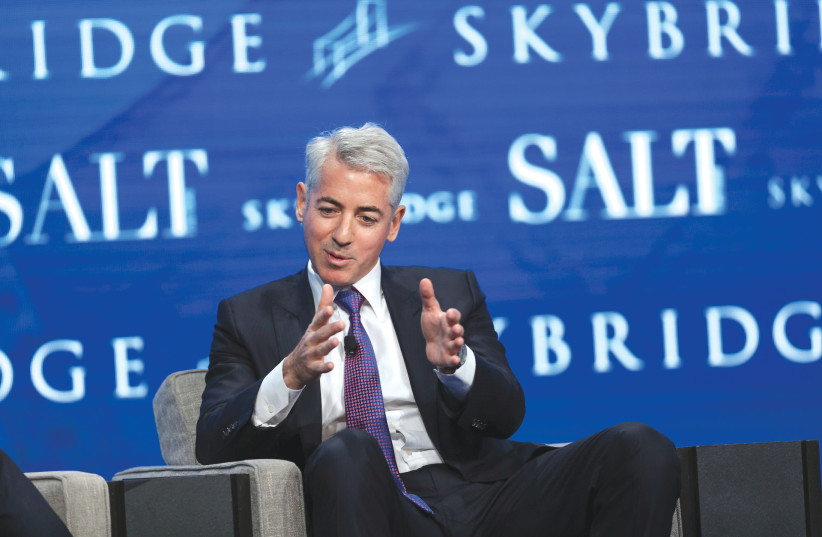Bill Ackman did not hedge his bets this past year.
In the aftermath of the October 7 Hamas massacre and the outpouring of support for the terrorists on US campuses, the American billionaire who founded Pershing Square Capital Management went to battle against his alma mater, Harvard University, where he had donated tens of millions of dollars over the years.
When 30 student organizations at Harvard issued a statement on October 9 labeling Israel as being “fully responsible” for the Hamas slaughter and the university’s administration remained silent, Ackman went into takeover mode.
He posted on X/Twitter that the names of the signatories should be published so that his company and other potential employers would know their stance before hiring them.
“I don’t want any supporters of terrorism in our company,” said Ackman.
The campaign forced some organizations to withdraw their statements and prompted some students to cover their faces out of fear for their postgraduate future.

Tackling pro-Palestinian campus activity
Ackman then began targeting Harvard’s administration and Harvard’s then-president in particular, Claudine Gay, to curb pro-Palestinian activity on campus. He recruited donors like him to also exert pressure by withholding their financial contributions, including to other universities rife with anti-Israel and antisemitic behavior.
Ackman furthered his campaign against Gay after she, along with Liz Magill, now ex-president of the University of Pennsylvania, and MIT president Sally Kornbluth gave opaque, legalese testimonies on post-October 7 antisemitism on campus during a congressional hearing. Gay and Magill were forced to resign due to an uproar over the incident; Kornbluth was pressured to do the same but managed to hold on to her position.
“Why has antisemitism exploded on campus and around the world?” he asked. “Because of leaders like presidents Gay, Magill, and Kornbluth who believe genocide depends on context.”
He even claimed in social media posts that Harvard hired Gay only to fulfill diversity requirements, an accusation that Gay and Harvard deny.
More recently, Ackman has lost some luster and bipartisan support, by endorsing US presidential candidate Donald Trump and criticizing the anti-government protests in Israel as “rewarding Hamas for their barbaric acts and blaming their leadership for the loss.”
Still, when the shock over the anti-Israel protests on US campuses paralyzed many in the Israel advocacy community, Ackman stood out for his straight talk and influential actions.
Speaking with Bill Ackman
How did the events of October 7 affect you personally and how did they change your way of looking at the world?
October 7 was a wake up call for me about the importance of Israel, the omnipresence of antisemitism, problems with the elite higher education system in the US, and growing control of the Democratic Party by the progressive wing of the party, among other concerns.
Were you surprised by the campus protests and vehement antisemitism that arose in response to Israel’s war in Gaza
Yes. Shocked would be a more accurate characterization.
Do you think that your public campaign against Harvard’s policies have had a positive effect?
Yes to some degree. Harvard is now under enormous scrutiny from the Congress, its alumni community, and others which should have a positive impact and help to steer the university from driving over a cliff, where it was heading prior to October 7.
Has your public support for Israel affected your business relationships or personal relationships at all?
Yes. It has had a positive impact in that many partners, investors, and others are highly supportive of my public support for Israel. To the extent that there is any negative impact, it has not been material or even visible to me or to the company.
You’ve been very vocal in your support for former president Trump. Was that a result of the Biden/Harris response to the war against Hamas?
My support for Trump has arisen due to a number of factors, which include the fact that I believe that the world has become a much less safe place due to the current administration’s foreign policy and actions. I believe that a Trump administration would lead to a safer world and a more peaceful Middle East.
Do you think American Jews’ place and standing in the US has forever been altered as a result of the last year?
No. I do think October 7 and the events thereafter have brought the global Jewish community much closer together, and American Jews and others around the world have become inherently more supportive of Israel.
Do you think Israel’s robust tech/innovation and venture capital world will be able to withstand the battering it’s taken over the last year?
Definitely yes.
Do you think Israel is still a good place to invest in?
Absolutely. Unfortunately, the world has become a much less safe place. Companies with Israeli innovations in surveillance, AI, security, and defense will be huge beneficiaries of recent events as there will be growing demand for their products and services.

